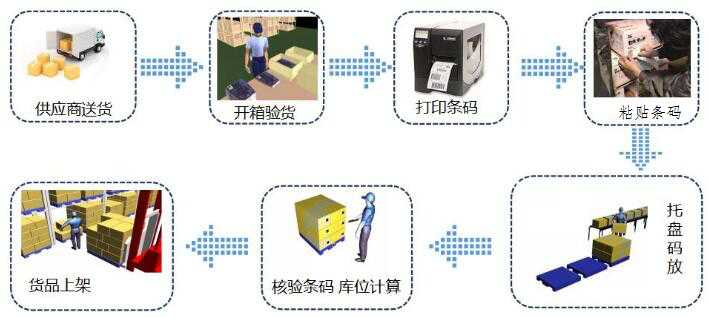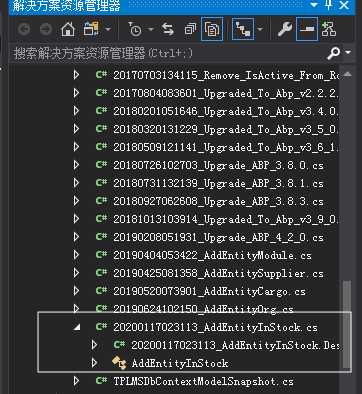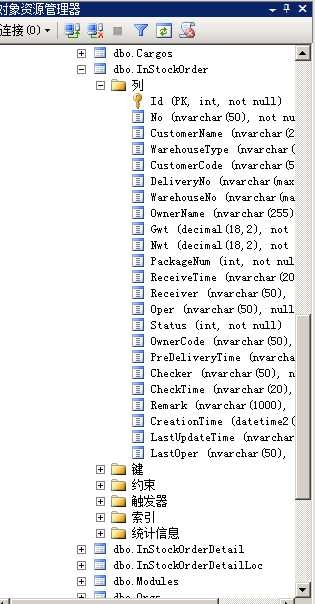标签:检验 资源 ace serve 十六 lamt 数据 业务 mep
abp(net core)+easyui+efcore实现仓储管理系统——EasyUI前端页面框架 (十八)
abp(net core)+easyui+efcore实现仓储管理系统——ABP WebAPI与EasyUI结合增删改查之八(三十四)
一.前言
通过前面的文章( abp(net core)+easyui+efcore实现仓储管理系统——ABP WebAPI与EasyUI结合增删改查之一(二十七) 至abp(net core)+easyui+efcore实现仓储管理系统——ABP WebAPI与EasyUI结合增删改查之十(三十六) )的学习,我们已经有实现了使用ABP提供的WebAPI方式+EasyUI来实现增删改查的功能。之前我们把一些基本的信息已经完成了,如货物信息,供应商信息。有了前面的基础信息,我们可以实现入库管理功能。从本章开始我们来学习一个入库单功能,这个将会涉及DataGrid的主从功能。
二、入库单的流程
1.一般情况下会有一个前置的OMS系统——即订单管理系统。主要功能之一是由供应商填写送货单。
如果公司有货代、仓储、运输等业务,或者是给某些大型客户(例如宜家、联想等)做第三方的物流服务,那么在做物流系统时入库单流程时,需要考虑入库单的前置流程——订单管理系统。
订单管理系统(OMS)是物流信息管理系统的一部分,通过对客户下达的订单进行管理及跟踪,动态掌握订单的进展和完成情况,提升物流过程中的作业效率,从而节省运作时间和作业成本,提高物流企业的市场竞争力。顾名思义,订单管理系统是物流企业用户、供应商用户、客户对于订单的管控、跟踪的系统,衔接着WMS、运输管理系统、订舱系统等,是物流信息管理系统的基础模块。
简单地说订单管理系统作为整个物流信息管理系统的基础核心,管理着所有的交易进出。一个好的订单管理系统需要有很好地扩展性和流畅性,在一个物流信息管理系统从0-1的过程,订单管理系统作为其基础模块需要提前考虑到各系统的扩展,订单管理系统如果在前期就能考虑到后面的扩展,相信对于物流企业的壮大会非常有帮助。
流畅性指的是整个交易链路需要很流畅,早期公司做订单系统时,想的很复杂,想做的很全面,最后做的非常庞大,但是却没有考虑到整个物流流程的通畅性,导致连基础的订单流程都没有办法正常走下去,所以,在从0到1地做一套订单管理系统时,需要有一些前瞻性,但落地时,需要先实现一个可以把整个流程走下去的简单的订单管理系统,然后不断的去试错->改进。
2.当运输公司把货物送到仓库时,仓库会有检验员进行抽检,并制作入库单,分配库位,然后打印标签,粘贴条码标签,分配托盘,核验条码标签,货物上架,并在系统中对入库单进行审核通过。整个流程如下图。

当然我们接下来要实现的入库单功能,没有这么复杂。 我们没有实现订单管理系统,这个有时间后面补上。
三、创建入库单实体
1. 做为一个入库单,在数据库中一般存在三张表,表头InStockOrder,表体InStockDetail、库位表InStockDetailLoc。
2.在Visual Studio 2017的“解决方案资源管理器”中,右键单击“ABP.TPLMS.Core”项目的“Entitys”文件夹,在弹出菜单中选择“添加” >
> “类”。 将类命名为 InStockOrder,然后选择“添加”。
3.创建InStockOrder类继承自Entity<int>,通过实现审计模块中的IHasCreationTime来实现保存创建时间。代码如下:
using Abp.Domain.Entities; using Abp.Domain.Entities.Auditing; using System; using System.Collections.Generic; using System.ComponentModel.DataAnnotations; using System.ComponentModel.DataAnnotations.Schema; using System.Text; namespace ABP.TPLMS.Entitys { public class InStockOrder : Entity<int>, IHasCreationTime { public const int MaxLength = 255; public InStockOrder() { No = string.Empty; CustomerCode = string.Empty; CustomerName = string.Empty; WarehouseNo = string.Empty; WarehouseType = string.Empty; DeliveryNo = string.Empty; Receiver = string.Empty; ReceiveTime = string.Empty; CreationTime = DateTime.Now; Oper = string.Empty; Checker = string.Empty; CheckTime = string.Empty; Gwt = 0; Nwt = 0; PackageNum = 0; OwnerCode = string.Empty; OwnerName = string.Empty; Remark = string.Empty; Status = 0; PreDeliveryTime = string.Empty; } [StringLength(50)] [Required] public string No { get; set; } /// <summary> /// 客户名称 /// </summary> [StringLength(MaxLength)] [Required] public string CustomerName { get; set; } public string WarehouseType { get; set; } /// <summary> /// 客户代码 /// </summary> [StringLength(50)] [Required] public string CustomerCode { get; set; } /// <summary> /// 送货单号 /// </summary> public string DeliveryNo { get; set; } /// <summary> /// 仓库号 /// </summary> public string WarehouseNo { get; set; } /// <summary> /// 货主 /// </summary> [StringLength(MaxLength)] [Required] public string OwnerName { get; set; } public decimal Gwt { get; set; } public decimal Nwt { get; set; } public int PackageNum { get; set; } /// <summary> /// 接收时间 /// </summary> [StringLength(20)] public string ReceiveTime { get; set; } /// <summary> /// 接收人 /// </summary> [StringLength(50)] public string Receiver { get; set; } [StringLength(50)] public string Oper { get; set; } public int Status { get; set; } [StringLength(50)] public string OwnerCode { get; set; } /// <summary> /// 预计送货时间 /// </summary> [StringLength(20)] public string PreDeliveryTime { get; set; } /// <summary> /// 审核人 /// </summary> [StringLength(50)] public string Checker { get; set; } [StringLength(20)] public string CheckTime { get; set; } [StringLength(1000)] public string Remark { get; set; } public DateTime CreationTime { get; set; } [StringLength(20)] public string LastUpdateTime { get; set; } [StringLength(50)] public string LastOper { get; set; } [NotMapped] public List<InStockOrderDetail> InStockOrderDetail { get; set; } } }
4.重得第2,3步,我们在“ABP.TPLMS.Core”项目的“Entitys”文件夹,依次创建InStockOrderDetail与InStockOrderDetailLoc两个类。代码如下:
using Abp.Domain.Entities; using Abp.Domain.Entities.Auditing; using System; using System.Collections.Generic; using System.ComponentModel.DataAnnotations; using System.ComponentModel.DataAnnotations.Schema; using System.Text; namespace ABP.TPLMS.Entitys { public class InStockOrderDetail : Entity<int>, IHasCreationTime { public const int MaxLength = 255; public InStockOrderDetail() { this.Qty = 0; this.CargoCode = string.Empty; this.CargoName = string.Empty; this.Brand = string.Empty; this.Country = string.Empty; this.CreationTime = DateTime.Now; this.Curr = string.Empty; this.GrossWt = 0; this.Height = 0; this.HSCode = string.Empty; this.Length = 0; this.SecdLawfQty = 0; this.LawfQty = 0; this.NetWt = 0; this.Package = string.Empty; this.Price = 0; this.Spcf = string.Empty; this.Unit = string.Empty; this.InStockNo = string.Empty; this.LawfUnit = string.Empty; this.Vol = 0; this.Width = 0; this.LawfUnit = string.Empty; this.SecdLawfUnit = string.Empty; this.SeqNo = 0; this.Batch = string.Empty; this.DeliveryOrderDetailId = 0; } public int SupplierId { get; set; } [MaxLength(50)] public string CargoCode { get; set; } [MaxLength(10)] public string HSCode { get; set; } [MaxLength(MaxLength)] public string CargoName { get; set; } [MaxLength(MaxLength)] public string Spcf { get; set; } [MaxLength(20)] public string Unit { get; set; } [MaxLength(20)] public string Country { get; set; } [MaxLength(50)] public string Brand { get; set; } [MaxLength(20)] public string Curr { get; set; } [MaxLength(20)] public string Package { get; set; } public decimal Length { get; set; } public decimal Width { get; set; } public decimal Height { get; set; } public decimal Vol { get; set; } public decimal Price { get; set; } public decimal TotalAmt { get; set; } public decimal GrossWt { get; set; } public decimal NetWt { get; set; } public DateTime CreationTime { get; set; } [MaxLength(20)] public string InStockNo { get; set; } public int SeqNo { get; set; } public decimal Qty { get; set; } public decimal LawfQty { get; set; } public decimal SecdLawfQty { get; set; } [MaxLength(20)] public string LawfUnit { get; set; } [MaxLength(20)] public string SecdLawfUnit { get; set; } [MaxLength(20)] public string Batch { get; set; } public int DeliveryOrderDetailId { get; set; } [NotMapped] public List<InStockOrderDetailLoc> InStockOrderDetailLoc { get; set; } } }
using Abp.Domain.Entities; using Abp.Domain.Entities.Auditing; using System; using System.Collections.Generic; using System.ComponentModel.DataAnnotations; using System.Text; namespace ABP.TPLMS.Entitys { public class InStockOrderDetailLoc : Entity<int>, IHasCreationTime { public InStockOrderDetailLoc() { this.Qty = 0; this.SeqNo = 0; this.Loc = string.Empty; this.CreationTime = DateTime.Now; this.InStockOrderDetailId = 0; } public int InStockOrderDetailId { get; set; } public int SeqNo { get; set; } [StringLength(50)] public string Loc { get; set; } public decimal Qty { get; set; } public DateTime CreationTime { get; set; } } }
5.定义入库单的实体之后,我们去“ABP.TPLMS.EntityFrameworkCore”项目中的“TPLMSDbContext”类中定义实体对应的DbSet,以应用Code First 数据迁移。添加以下代码
using Microsoft.EntityFrameworkCore; using Abp.Zero.EntityFrameworkCore; using ABP.TPLMS.Authorization.Roles; using ABP.TPLMS.Authorization.Users; using ABP.TPLMS.MultiTenancy; using ABP.TPLMS.Entitys; namespace ABP.TPLMS.EntityFrameworkCore { public class TPLMSDbContext : AbpZeroDbContext<Tenant, Role, User, TPLMSDbContext> { /* Define a DbSet for each entity of the application */ public TPLMSDbContext(DbContextOptions<TPLMSDbContext> options) : base(options) { } public DbSet<Module> Modules { get; set; } public DbSet<Supplier> Suppliers { get; set; } public DbSet<Cargo> Cargos { get; set; } public DbSet<Org> Orgs { get; set; } public virtual DbSet<InStockOrder> InStockOrder { get; set; } public virtual DbSet<InStockOrderDetail> InStockOrderDetail { get; set; } public virtual DbSet<InStockOrderDetailLoc> InStockOrderDetailLoc { get; set; } } }
7. 在PMC中,默认项目选择EntityframeworkCore对应的项目后。输入以下命令:Add-Migration AddEntityInStock,创建迁移。如下图。

8. 在上面的命令执行完毕之后,创建成功后,会在Migrations文件夹下创建时间_AddEntityInStock格式的类文件,这些代码是基于DbContext指定的模型。如下图。

9.在程序包管理器控制台,输入Update-Database,回车执行迁移。执行成功后,如下图。

10. 在SQL Server Management Studio中查看数据库,InStockOrder、InStockOrderDetail、InStockOrderDetailLoc三张表创建成功。

abp(net core)+easyui+efcore实现仓储管理系统——入库管理之一(三十七)
标签:检验 资源 ace serve 十六 lamt 数据 业务 mep
原文地址:https://www.cnblogs.com/chillsrc/p/12342166.html